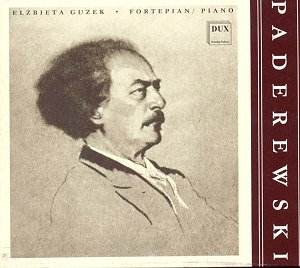Though
his career as concert pianist, celebrity
and politician left him little time
for composition, like many another virtuoso
performer, Paderewski did write a considerable
amount of piano music. Some falls into
the Chopinesque or the morceaux categories;
some possesses richness of nostalgia
and other pieces a fragile delicacy.
Standing as an oak to saplings however
is the powerful Sonata and I think it’s
correct programming for Dux to lead
with the Humoresques, Mazurkas and the
thoroughly impressive Op. 16 set – which
includes a beautiful Melodie and a vivacious,
imaginative Variations – before we reach
that big 35-minute Sonata.
We
start though with Paderewski’s Greatest
Hit, his Minuet in G major, complete
with folkish lilt. Elżbieta Guzek
certainly plays it for maximal contrasts,
employing big dynamics and lashings
of teasing rubato and maybe rather too
much depth of bass sonority. For the
Chopin strain one need turn no further
than the A major Mazurka – homage would
be a more descriptive word than pastiche
I think. In the companion E minor one
can hear how, inflecting it with greater
tentativeness and pensive detachment,
Paderewski brings out the pathos with
acute security. A strong technique is
needed at the service of an essentially
salon piece such as the Cracovienne
fantastique – well pointed and knowingly
humorous as well – and Paderewski deals
alike with dance rhythms and affecting
melancholy in the Legende and the Melodie
from the Chants du voyageur respectively.
Paderewski can be stolid, it’s undeniable,
and some of his passagework can tend
toward the generic on occasion, as when
the Theme varié begins but as
compensation there is some truly curvaceous
lyricism in fine late-Romantic style.
The
Sonata was written in 1903 when Paderewski
was forty-three and at the height of
his purely pianistic fame. He was at
one time the world’s most expensive
pianist commanding astounding fees.
It’s a work long on powerful rhetoric
with numerous moments of intense, romantic
complexity. The powerful climaxes from
8.30 in this performance don’t register
with quite the force they might, mainly
due to the rather cold acoustic, but
the language is certainly unsettling
enough in its fissure and drama. Broody
rolled chords announce the slow movement
that rises inexorably to a crest of
animation, splendidly argued by Guzek.
The finale is maybe a slight let-down
in its relative predictability but it
does nonetheless drive with real animation
and sheer confidence.
The
attractions of this disc are cemented
by the fine looking booklet with its
sepia tints and etched profile of the
tonsorially engorged composer. This
is a much overlooked slice of repertoire
but with increased awareness of his
Concerto and Symphony we can hope that
Dux’s fine work in the instrumental
and chamber field will gain the recognition
it deserves.
Jonathan
Woolf
